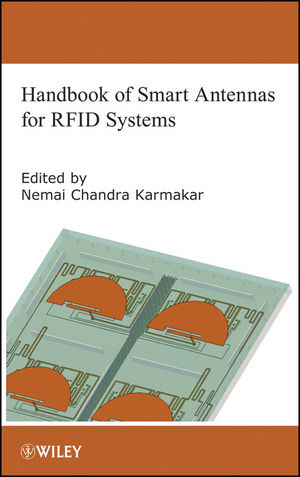Handbook of Smart Antennas for RFID SystemsISBN: 978-0-470-38764-1
Hardcover
648 pages
October 2010
 Other Available Formats: E-book
|
||||||
Preface.
Acknowledgement.
Section I: Introduction to RFID.
Chapter 1: The Evolution of RFID (B. Jamali, The University of Adelaide).
Chapter 2: Introduction to RFID systems (S.M. Roy and N.C. Karmakar, Monash University).
Chapter 3: Recent Paradigm Shift in RFID and Smart Antennas (N.C. Karmakar, Monash University).
Section II: RFID Reader Systems.
Chapter 4: Modern RFID Readers (S. Parardovic and N.C. Karmakar, Monash University).
Chapter 5: A Development Platform for SDR based RFID Reader (B. Jamali, The University of Adelaide).
Section III: Physical Layer Developments of Smart Antennas for RFID Systems.
Chapter 6: RFID Reader Antenna--A Smart Design Approach (S.M. Roy and N.C. Karmakar, Monash University).
Chapter 7: Handheld Reader Antenna at 5.8 GHz (S.M. Roy and N.C. Karmakar, Monash University).
Chapter 8: FPGA Controlled Phased Array Antenna Development for UHF RFID Reader (N.C. Karmakar, P. Zakavi and M. Kumbukage, Monash University).
Chapter 9: Optically Controlled Phased Array Antennas for UWB RFID Reader (A. Arokiaswami, P. Q. Thai, Nanyang Technological University and N.C. Karmakar, Monash University).
Chapter 10: Adaptive Antenna Arrays for RFID (M. Trinkle and B. Jamali, The University of Adelaide).
Chapter 11: Design of Portable RFID Smart Antenna System?A Practical Approach (J.S. Fu, Chang Gung University, W. Liu, Nanyang Technological University and N.C. Karmakar, Monash University).
Section IV: DOA and Localization of RFID Tags using Smart Antennas.
Chapter 12: Direction of Arrival Estimation based on A Single Port Smart Antenna for RFID Applications (Chen Sun, National Institute of Information and Communication Technology (NICT) and N.C. Karmakar, Monash University).
Chapter 13: DOA Geo-location in Real-Time Indoor WiFi System Utilizing Smart Antennas (C.H. Lim, B.P. Ng, M.H. Er, J.P. Lie and W. Wang, Nanyang Technological University).
Chapter 14: Direction of Arrival (DoA) Estimation of Impulse Radio UWB RFID Tags (J.P. Lie, B.P. Ng, C.H. Lim and C.M. S. See, Nanyang Technological University).
Chapter 15: Localization techniques in single and multihop wireless networks (V. Lakafosis, Rushi Vyas and M.M. Tentzeris, Georgia Institute of Technology).
Section V: Multi-Antenna RFID Tags.
Chapter 16: Multi-antenna Chipless RFID Tags (I. Balbin and N. C. Karmakar, Monash University).
Chapter 17: Link Budgets for Backscatter Radio Systems (J.D. Griffin and G.D. Durgin, Georgia Institute of Technology).
Chapter 18: Fading Statistics for Multi-Antenna RF Tags (J.D. Griffin and G.D. Durgin, Georgia Institute of Technology).
Section VI: MIMO Antennas for RFID Systems.
Chapter 19: Optimum Power Allocation in Multiple-Input-Multiple-Output (MIMO) Systems under Independent Rayleigh Fading (J.S. Fu, Chang Gung University, W. Liu, Nanyang Technological University and N. C. Karmakar, Monash University).
Chapter 20: Low-cost and Compact RF-MIMO Transceivers (I. Santamaria, J. Via, V. Elvira, J. Ibanez, J. Perez, University of Cantabria.
R. Eickhoff, and U. Mayer, Dresden University of Technology).
Chapter 21: Blind Channel Estimation in MIMO using Multi-carrier CDMA (A. Rahim, Monash University, K. M. Ahmed, Asian Institute of Technology and N. C. Karmakar, Monash University).
Section VII: Anti-Collision Algorithm and Smart Antennas for RFID Systems.
Chapter 22: Anti-collision Algorithm and Smart Antennas for RFID Systems (Q. J. Teoh and N. C. Karmakar, Monash University).
Chapter 23: RFID Anti-Collision Algorithms with Multi-Packet Reception (J. Lee, Hewlett-Packard Laboratories, T. Kwon, Seoul National University).
Chapter 24: Anti-Collision of RFID tags using Capturing Effect (Q. J. Teoh and N. C. Karmakar, Monash University).



